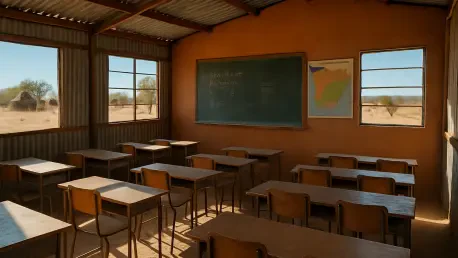In the vast, arid landscapes of Namibia’s Omaheke region, where rural communities often grapple with limited resources and infrastructure, a remarkable transformation is unfolding at Donkerbos Primary School in the Otjombinde constituency. A collaborative effort between Mobile Telecommunications Limited (MTC) and the Motor Vehicle Accident (MVA) Fund has introduced a new block of four classrooms and a staff office, valued at N$2.4 million, breathing new life into the educational prospects of this underserved area. This initiative is more than just a construction project; it symbolizes a commitment to bridging the gap between urban and rural education. By addressing long-standing challenges like overcrowded learning spaces, this development offers a glimpse of hope and opportunity for children who have often been left on the margins of national progress, setting the stage for a deeper look into how such projects can reshape futures.
Bridging the Educational Divide
The disparity in educational access between urban and rural areas in Namibia has long been a pressing concern, with many remote schools lacking basic facilities to support effective learning. At Donkerbos Primary School, students and teachers previously endured overcrowded classrooms that stifled engagement and made personalized instruction nearly impossible. The absence of a dedicated staff room further compounded these difficulties, leaving educators without a space to prepare or collaborate. The recent addition of new classrooms and an office space through the MTC Rural Schools Project marks a significant turning point. This infrastructure not only alleviates physical constraints but also creates an environment where teaching and learning can thrive, demonstrating how targeted investments can directly address systemic inequities in rural education and provide a foundation for academic success.
Beyond the immediate benefits to Donkerbos Primary School, this project reflects a broader mission to ensure educational equity across Namibia’s diverse regions. The MTC Rural Schools Project, in partnership with the MVA Fund, has already delivered 53 classrooms nationwide since its launch, with plans to expand further in the coming years. Omaheke Governor Pijoo Nganate, who officiated the opening of the new facilities, emphasized that such initiatives are a powerful reminder of the importance of inclusion. Rural communities like those in Omaheke are integral to the nation’s fabric, yet they are often overlooked in development plans. This project stands as a beacon of hope, showing that quality education can and should be accessible to every child, regardless of geographic location, and reinforcing the idea that no community should be left behind in the pursuit of progress.
Corporate Commitment to Social Impact
The role of corporate entities in driving social change is increasingly evident through initiatives like the one at Donkerbos Primary School, where MTC and the MVA Fund have demonstrated a strong dedication to improving educational outcomes. Tim Ekandjo from MTC highlighted the organization’s goal of creating equal access to quality learning environments across the country, underscoring that education is a fundamental right that must be upheld. Similarly, John Haufiku of the MVA Fund stressed the importance of their partnership in enhancing learning conditions for Namibian children. This collaboration showcases how private sector involvement can address critical national issues, such as classroom shortages, by pooling resources and expertise to create lasting impact in marginalized areas, setting a precedent for other companies to follow suit.
The transformative effect of this project extends beyond mere infrastructure, as it fosters a sense of dignity and opportunity for rural learners who previously faced significant barriers. School Principal Marah Patience expressed heartfelt gratitude for the new facilities, noting that the improved environment has uplifted both students and staff. Where once there were struggles with inadequate space, there is now room for growth, creativity, and effective education. This shift illustrates the profound difference that strategic interventions can make in rural settings, proving that corporate social responsibility, when aligned with community needs, can yield tangible benefits. Such efforts highlight a growing trend of public-private partnerships working together to tackle systemic challenges and build a stronger foundation for future generations.
Seeds of Progress for Tomorrow
Reflecting on the strides made at Donkerbos Primary School, it is evident that the collaboration between MTC and the MVA Fund tackled immediate challenges like overcrowding while planting seeds for long-term societal advancement. The unveiling of the new classrooms and staff office stood as a milestone, symbolizing not just physical growth but a renewed commitment to inclusivity and equity in education. This initiative reminded all stakeholders that rural communities deserve a place in Namibia’s developmental vision, ensuring that children in even the most remote areas have access to conducive learning spaces.
Looking ahead, the success of this project should inspire further action to sustain and expand such efforts across other underserved regions. Policymakers, corporate leaders, and community advocates must build on this momentum by identifying additional schools in need and replicating this model of partnership. Prioritizing rural education through continued investments will help close the gap in opportunities, empowering young learners to contribute meaningfully to the nation’s future. This endeavor serves as a call to deepen commitments, ensuring that every child, no matter where they are, can dream without limits.









